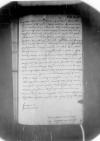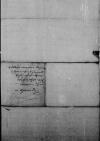Letter #4178
Johann Albrecht of Brandenburg-Ansbach to Ioannes DANTISCUSHöchst, 1532-04-13
Manuscript sources:
Auxiliary sources:
| ||||||
Text & apparatus & commentary Plain text Text & commentary Text & apparatus
[Erw]yrdigen meynen besun[dern] hern und freundt,
Erwyrdiger besunderer gutter her und freundt.
Dis mein schreyben thue ich in keyner andern mainung cundt, das ire mecht sehen damit ich eines nit vergisse. / Und las euch wyssen, das ich frisch und gesundt pin. Selchs von euch zuhoren precht meynem hertzen ein grosse freudt so hab ich euch kurtzlich nach eurem abreysen von
Geben zu
Sempre in servicio di Vostra Sincerita

